Thanks for your support! If you make a purchase using our links in this article, we may make a commission. And, as an Amazon Associate, I earn from qualifying purchases. See the full disclosure here.
Updated April 15, 2024
When someone goes to purchase a camper or RV, they usually intend to take it out during the summer. After all, there are plenty of things you can do in the summer and not as many activities in the winter.
However, that does not mean there is nothing you can do in the winter. After you make your purchase you might wonder, can you use a camper in the winter? Typically, you can use a camper during the winter, but it depends on the camper or RV that you purchased.
No matter the RV you purchase, it will provide you protection from the elements like rain, snow, and wind. It gives you a roof over your head and a lot of the basic things you need to survive.
However, depending on the RV you might have problems staying warm. Not every trailer has the insulation you need to live in comfort in an RV during the winter. As a result, you will need to insulate the trailer yourself if you have a trailer that is not properly prepared for winter.
Fortunately, insulating is a manageable task to take on. It will take a decent amount of work, but it can be done. Once you insulate your trailer you will be able to enjoy the comforts of your RV during the winter.
- Are Campgrounds Open In The Winter?
- Can You Use a Camper in the Winter?
- Can You Live in an RV or Camper in the Winter?
- How to Keep Your Camper Warm in the Winter
- 8 Tips to Prepare Your RV for Winter Camping
- 1. Add Extra Insulation to Your Camper for Winter Camping and Living
- 2. Protect Your RV Plumbing for Camping in Winter Weather
- 3. Insulate Your RV Water Heater
- 4. Get a Tune-up
- 5. Consider Purchasing Solar Panels
- 6. Keep Water Out of Your RV for Winter Camping
- 7. Purchase a Smaller RV
- 8. Use an RV Skirt for Winter Insulation
- RELATED READING
- How Long Will An RV Propane Tank Last In The Winter?
- Is It Safe To Use Space Heaters In An RV?
- Tips to Keep Warm While Winter Camping
- What Are the Best Campers for Winter Camping?
- 4 FAQ About Using an RV in Winter
- Get Started on Your Winter Camping Adventure
- Related Reading:
- Mike Scarpignato – Bio
Are Campgrounds Open In The Winter?
Some campgrounds close throughout the winter months, limit the available number of sites, or close facilities on a case-by-case basis. But not all campgrounds do the same, and some of that depends on location. For instance, campgrounds in Florida are far less likely to shut down in the winter than campgrounds in North Dakota or Michigan.
The ones that do close, do so for obvious reasons. In many areas throughout the country, winter brings heavy snow and dangerous driving conditions. These campgrounds have to shut off their water supplies and winterize their facilities, much in the same way you winterize your RV, and for all the same reasons.
Many National Parks remain open, however. Since National Parks often don’t offer RV hookups, there’s nothing to winterize. Though the minimal crowd sizes in the winter detrimentally affect the bottom line for campgrounds, a National Park will still be a National Park tomorrow, regardless of visitor numbers. You can track which National Parks are open in the winter by
Can You Use a Camper in the Winter?
Yes, you can use a camper in the winter. Some campers are better suited for sub-freezing temperatures, but you can use many types of campers in the winter with some preparation. Insulation, heating, and trip planning are all top considerations.
As long as you plan ahead and be sure to insulate, prepare your plumbing, and have a proper heat source, using a camper in the winter can be quite enjoyable.
Can You Live in an RV or Camper in the Winter?
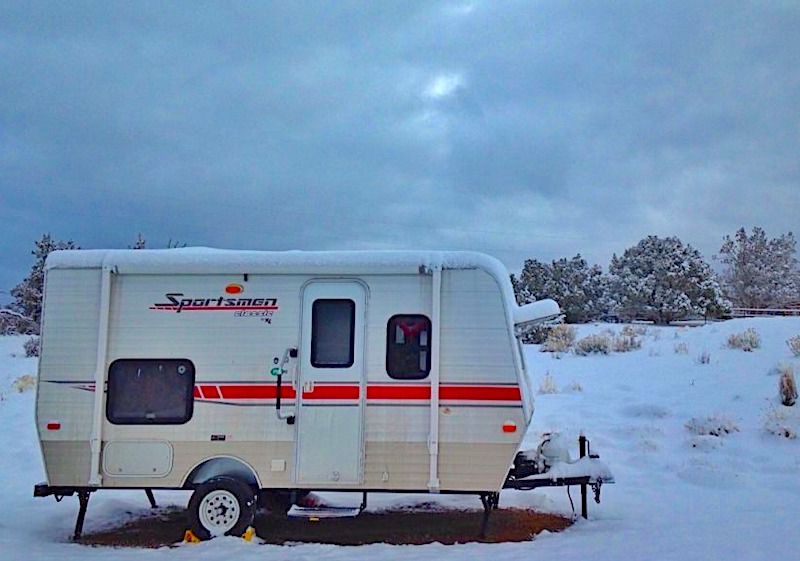
As we mentioned above, you can live in your RV or camper during the winter. However, you will need to take some precautionary steps for your safety and the wellness of your trailer. The first and most obvious problem you will run into is the cold. Not all trailers have the insulation you need to stay warm in the winter and covering yourself in blankets is not really a viable solution. As a result, you will need to add insulation to your RV so that you do not get hypothermia at night.
Furthermore, a problem many people will overlook is the possibility of their pipes freezing. This can be a disaster for an RV owner as it would completely ruin your plumbing system. As a result, you need to take action to make sure that this does not happen to you. If it does happen it could cause permanent damage to the system to the point where you might need to replace it entirely.
How to Keep Your Camper Warm in the Winter
One of the best things you can do to prepare your RV or camper for the winter is to insulate your windows and floors. Without proper insulation, you will be freezing cold at night and immediately want to go home. Not only will it ruin your trip emotionally, but it is also dangerous to live in an RV without insulation during the winter.
Without insulation, it will get very cold at night. This can cause you to get hypothermia or get sick in other ways. It is not worth the risk, so take the time and insulate your camper.
Additionally, it would not hurt to purchase a space heater to help you heat up the camper quickly. Whenever you open the door cold air will get in and begin to cool things down. However, if you have a space heater you can heat up the camper quickly and with ease.
We love our Mr. Heater Buddy for keeping our RV warm in the winter! Ours uses propane canisters which last about 4-5 hours on the lowest setting. But for longer winter camping the Mr. Heater with the adapter that connects to a larger propane tank is awesome!
8 Tips to Prepare Your RV for Winter Camping
Here we will give you several tips on how to prepare your RV for winter camping. Some things are more important for you to do than others, but all these tips can be helpful.
1. Add Extra Insulation to Your Camper for Winter Camping and Living
The first and most important thing for you to do is insulate your camper. Specifically, you need to add insulation to your windows and floors. One thing you can do to help insulate your camper is to add rugs and thermal curtains to your RV. They will help trap heat inside your camper.
Rugs are especially helpful because underneath the floor of your RV is cold earth. When you add rugs to the floor it creates an additional barrier to the floor. Additionally, the rug will feel more comfortable for your bare feet and keep them warmer than the bare floor.
Windows are quite possibly the biggest problem when it comes to insulating your RV. It is easy for heat to seep out of the cracks at the outside of the window. As a result, you need to make sure that they are properly sealed.
A quick way to fix your window problem is to cover them in bubble wrap or foam insulation boards. You can also hang heavy thermal curtains to cover the windows once you have insulated them in bubble wrap.
The biggest downside to this method of insulation is that it prevents most light from getting in through the windows. However, it is pretty easy to take down and put up, so if it is sunny outside you can take down the curtains and let in some natural light. When the sun is shining it will also provide you with some natural warmth.
2. Protect Your RV Plumbing for Camping in Winter Weather
After you insulate your trailer, the next most important thing to do is protect your plumbing. By protecting your plumbing you will be helping yourself in the short and long term. Adding plumbing protection can increase the lifespan of your pipes by years.
The first thing you can do is leave your freshwater tank empty and bring plenty of bottled water with you on your trip. You can drink bottled water and you can use it to do dishes and brush your teeth. By leaving your tank empty and using bottled water for day-to-day needs, you will not need to worry about your freshwater freezing in the tank.
Furthermore, you should purchase antifreeze and use it on gray and black tanks. All you need to do is pour some down the drain and flush some down the toilet. This should keep those tanks from freezing.
3. Insulate Your RV Water Heater
In addition to insulating your windows and floor, you will also want to insulate your water heater. You can use water heater insulation blankets to keep the temperature of your freshwater up.
Insulating your water heater is incredibly important because water expands when frozen. As you might be able to guess, this will cause serious problems when the water is in a confined space like a water heater. When the water freezes it will expand and that can cause the water heater to crack and burst. However, if you use an insulated blanket you can keep the temperature of the water in the heater up.
You should do the same thing with your pipes so that water does not freeze while it is outside of the tank. Otherwise, you may have pipes that crack and burst instead of the tank.
4. Get a Tune-up
It does not matter if you are someone who knows your way around a motor, you should consider taking your RV in for maintenance occasionally. Sometimes even if you know what you are doing it can be easy to look past certain things and overlook others. Getting a fresh set of eyes to take a look at your RV can be extremely helpful.
Getting a checkup will help you make sure that your RV is in the right condition to drive in winter weather. This will help you avoid accidents and better prepare yourself for more difficult winter camping.
5. Consider Purchasing Solar Panels
Purchasing solar panels might be an expensive purchase, but they can save you money in the long term. They are a one-time purchase that will eliminate your need for propane to run your appliances. Instead, you can use solar energy to power the appliances in your vehicle.
However, you should do your research before purchasing the first set of solar panels that you come across. Not all solar panels will be compatible with your vehicle, so you need to find panels that are a match.
Notably, there are two different kinds of solar panels, polycrystalline, and monocrystalline. Monocrystalline panels are more efficient, but they are also more expensive.
6. Keep Water Out of Your RV for Winter Camping
After a long day of being outside, you will want to lie down on your bed or couch and relax. Unfortunately, if you have been doing this for a few days and dragging in water with you, this will quickly become a disgusting exercise. As the water gets into your RV, mold will start to creep up the walls and find its way into cupboards.
One of the best ways to keep water out of your RV is to purchase vent covers. Vent covers will help keep heat in and they will provide proper ventilation for condensation and humidity build-up.
Additionally, you can purchase a dehumidifier for your RV. This will help lower the humidity levels in your RV so that mold is not a risk for you. It will also keep the air fresh in your RV.
7. Purchase a Smaller RV
Although this might not be an option for you if you already have an RV, it is a good thing to do if you are still in the process of purchasing. Smaller RVs are better options for the winter. This is because it takes less time to heat up a smaller space and it takes far less energy. It will also save you a lot of money on propane if you do not need the heat to be on constantly.
8. Use an RV Skirt for Winter Insulation
You might not have heard of an RV skirt, but it can be an effective tool to help winterproof your RV. An RV skirt is used to prevent heat from being lost from the underside of your RV. They are easy to attach as you can use velcro or a zipper slice to put it on and take it off with ease.
The very best RV skirting we found is AirSkirts. We love ours and we even made a video to show how AirSkirts kept our RV warmer for longer in cold temps. You can check out our video below to see how easy they are to set up and remove! And you can see our temperature test too!
How Long Will An RV Propane Tank Last In The Winter?
How long an RV propane tank lasts in the winter is a matter of what you use it for and how extensively. The furnace will greedily gobble up more propane than anything else you run, and it’s not really close. The stove top and oven are a distant second, followed by the water heater, fridge, and generator.
There is no direct answer to this, though there are ways you can calculate your overall usage. There are so many variables in an RV that it’s difficult to present an accurate number that someone won’t scoff at. Some RVers have fewer propane appliances than others. Some RVers prefer to stay toasty while others set their thermostats at 68°F.
Calculating usage for your propane tanks, based on your appliances and usage, is relatively simple. It’s not mathematically precise, because that’s nearly impossible. However, you can get a ballpark number by basing your consumption on the following: At a rate of 1,000 BTUs, a single gallon of propane will last approximately 95 hours.
Is It Safe To Use Space Heaters In An RV?
Generally speaking, it’s as safe to use an electric space heater in your RV as it is in a residential home, so long as you follow the safety precautions for using these devices. It’s understandable that an electric space heater is appealing to some. It doesn’t take much to heat up the smaller interior of an RV, and most space heaters are up to the task.
There are a few things you need to be aware of. Unfortunately, space heaters are a major contributing factor in house fires across the country, to the tune of over 50%. Space in an RV is often at a premium as well, and you never want to have a space heater situated within a few inches of clothing, curtains, bedding, etc.
You should also stick with space heaters that have a built-in thermostat. Most decent space heaters do these days, as well as fall detection (a safety feature that automatically cuts the heater’s power if it tips over). Remember, a space heater is also a significant power draw, which will make a difference if you’re not on shore power.
Tips to Keep Warm While Winter Camping
Here we will look at a few things you can do to keep yourself warm while you are out on your trip. These things we will be discussing are not related to winter-proofing your RV. Instead, they are things you can do as an individual to stay warm on cold days.
1. Sleep in a Thermal Sleeping Bag
Sleeping bags are usually used when you are camping in a tent or when you are outside completely. However, they can also be used when you are in your RV. Since they are used when people are sleeping outside, thermal sleeping bags are great for keeping you warm at night. As a result, you can use these sleeping bags in the winter when you are camping in your RV.
When purchasing a thermal sleeping bag, it is a good idea to purchase one with a lower temperature rating than the temperature you expect on your trip. It is better to get a thermal sleeping bag that keeps you a little too warm than one that does not keep you warm enough.
2. Use Your RV Oven
If you feel like it is taking a long time to heat up in your RV, a quick way to speed things up is to bake something. Having the oven on will help accelerate the heating process. However, you should not leave the oven on when you are not using it, you do not want to start a fire. That being said if you time your baking for when you need to heat up the RV, this can accelerate the heating process significantly.
3. Stay Active
It is something that your parents tell you as a kid. If you are cold go run around and warm up. This works just as well when you are an adult and you are out on a winter camping trip. So next time you need to heat up your RV, go outside and run around a bit while you wait. You will be surprised at how much that helps. Additionally, it will also help you pass the time while you wait for the RV to heat up.
4. Prepare Yourself Mentally
Before you head out on a winter camping trip one of the most important things for you to do is prepare yourself mentally. No matter what you do, a winter camping trip is not going to be as comfortable as one you take in the summer. However, if you mentally prepare you can have a great time.
What Are the Best Campers for Winter Camping?
Here we will look at a few of the best campers for winter camping. It is important to note that we did not rank the RVs. The list is not in any order.
1. Keystone Montana
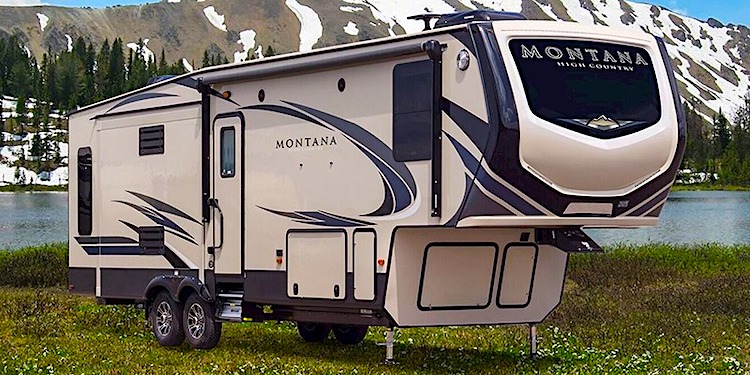
The Keystone Montana is an excellent fifth-wheel trailer for someone who wants to spend some time camping during the winter. The trailer includes an insulated main floor that is R-21 equivalent and insulated slide-out floors that are R-15 equivalent. It also has a foam core straight line heat duct system and an auto-ignition 35,000 BTU furnace.
The underbelly of the RV is insulated as well. It also comes with a fully vented attic system. These are only a few of the many features that make this RV an excellent winter camper.
2. Northwood Arctic Fox
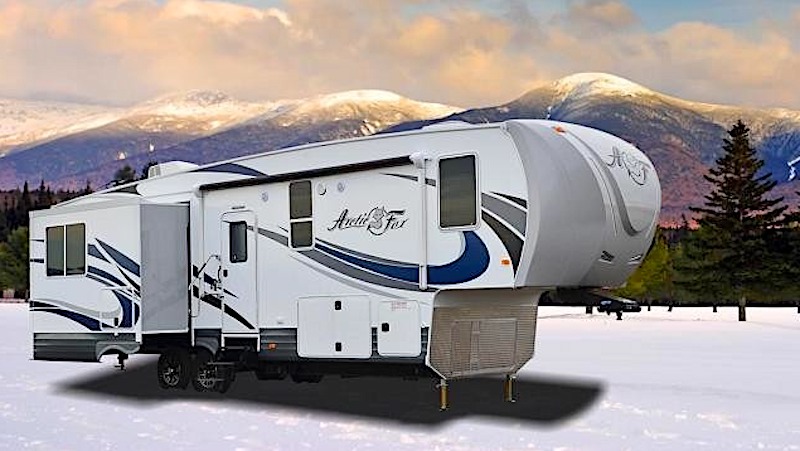
The Northwood Arctic Fox is another great option for those looking for an RV to keep them warm during the winter. This RV has four-season foam insulation throughout the vehicle and ceiling insulation that is R-18 equivalent. It also has a digital thermostat so that you can easily see if the temperature is starting to dip.
Not only does this RV prepare you for the winter, but it also has several luxury features. For example, the RV comes with a 19-inch LED TV with a DVD player. It has a microwave that is included with the RV and a jackknife sofa. So, you cannot really go wrong with this camper.
3. Heartland LM Arlington
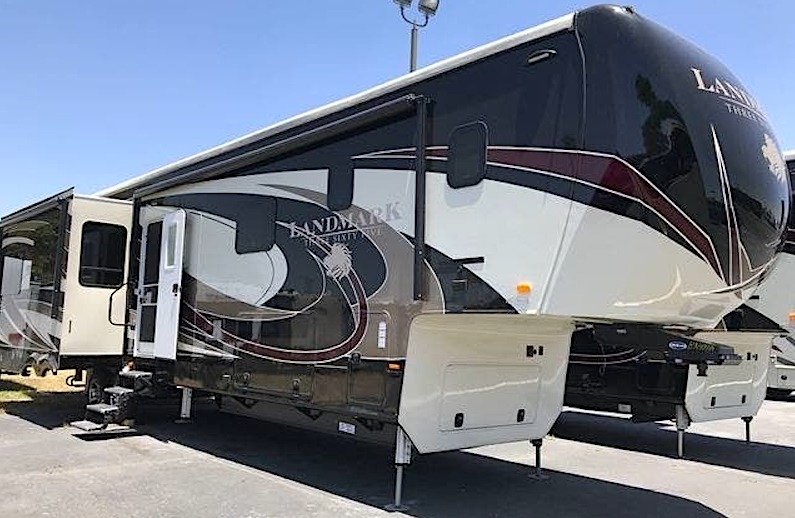
This RV can be purchased with the Yeti Extreme Cold Weather Package. This is one of the most popular Arctic packages available for winter campers. You do not need to purchase it with your RV, but it is extremely popular among winter campers.
The RV also comes with plenty of luxury features. It has a power tilt bed and bedroom reading lights. There is also a stainless-steel oven and a high-rose coffee table. It also has a lockable safe that you can use to keep your important items safe.
4 FAQ About Using an RV in Winter
1. How cold is too cold for RV camping?
If you prepare yourself and your camper properly, you can cozily RV camp in temperatures all the way down to 0, and lower in certain circumstances.
Many new RVs these days are made to be used in many seasons. And even older campers can be insulated to use in extreme cold weather.
The keys to camping or living in an RV in winter comfortably is insulation, heat, and moisture management.
2. How to insulate a camper for winter use?
There are a lot of spots on a camper that benefit from additional insulation to keep them warmer and cozier for winter camping. Here are some ideas:
- Skirt your camper to keep the cold wind from blowing underneath, this will help insulate your pipes and keep your RV warmer.
- Insulate your RV windows with heat-shrink window covers or insulation material like Reflectix.
- Insulate your RV skylights and vent fans with vent fan pillow inserts.
- Insulate around your slide-outs with weather stripping.
- If in a motorhome, hang blankets or curtains to separate the cab from the living area to keep the living area warmer.
3. How do you keep water lines from freezing in a camper?
One of the biggest challenges facing RVers in the winter is frozen pipes. There are a couple different ways to prevent your water lines from freezing in a camper.
- Winterize your camper using RV antifreeze. This will mean that you cannot use your water system. This is ideal if you just take short camping trips and don’t need to use the water.
- Keep your RV pipes warm by insulating your RV. You can also use electrical heat tape to keep vulnerable sections of plumbing from freezing.
4. Will RV holding tanks freeze?
RV holding tanks can freeze in weather that is consistently below freezing. To avoid this, you can choose the following options:
- Winterize your RV plumbing system with RV antifreeze. This will mean you can’t use your plumbing system or tanks while winter RV camping.
- Use RV tank heaters to help prevent your tanks from freezing.
Get Started on Your Winter Camping Adventure
After reading, we hope you feel better prepared to take your RV out on a camping trip during the winter. We know that there is a lot of information to absorb, but it should all be helpful as you prepare for a winter trip.
Camping in the winter is nothing like camping in the summer. There are a lot more precautions you need to take than in the summer. You need to insulate your RV, make sure you winter-proof your pipes and purchase a plethora of winter supplies. However, if you do all these things you can have a very enjoyable experience out in the snow.
Are you a new or experienced RV owner? Have you camped in the winter before? What interests you about taking your RV out in the winter? Let us know in the comments!
Related Reading:
– How to Keep an RV Water Hose from Freezing
– 10 Best 4 Season Travel Trailer Brands
– 10 Creative Ways to Heat a Camper and Stay Warm While Camping in Cold Winter Weather
– How Cold Does it Have to Get Before RV Pipes and Tanks Freeze?
Mike Scarpignato – Bio
Mike Scarpignato created RVBlogger.com over five years ago in 2018 to share all we have learned about RV camping.
Mike is an avid outdoorsman with decades of experience tent camping and traveling in his 2008 Gulf Stream Conquest Class C RV and 2021 Thor Challenger Class A motorhome.
We attend RV Shows and visit RV dealerships all across the country to tour and review drivable motorhomes and towable trailers to provide the best evaluations of these RVs in our blog articles and YouTube videos.
We are 3/4-time RVers who created RVBlogger.com to provide helpful information about all kinds of RVs and related products, gear, camping memberships, tips, hacks and advice.


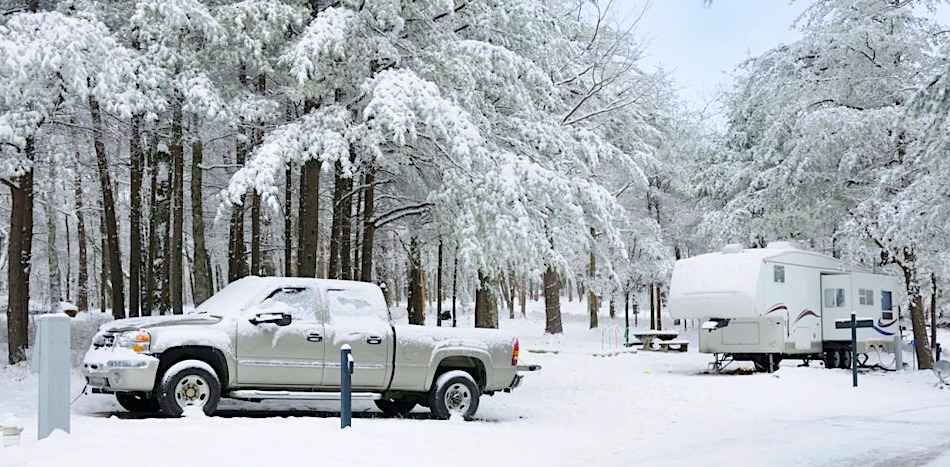
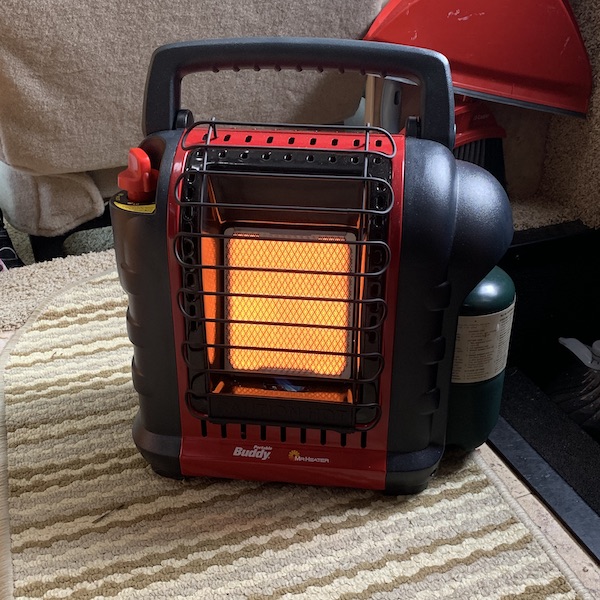
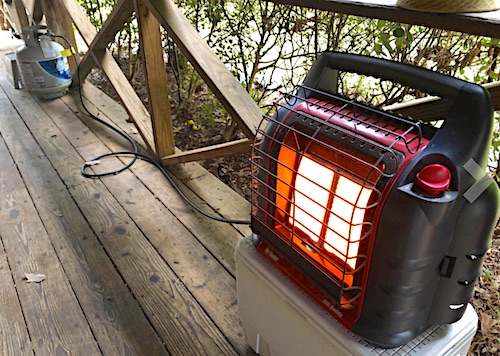
Thanks, this was a helpful article. We don’t YET have a camper but are looking and thinking about what we’d like, and winter camping appeals to us…
Hi Laurie,
Best of luck looking for your new camper!
Winter camping is a challenge but a lot of fun too!
Mike
I lived in an RV over the winter last year and appreciate your advice and article. I had shore power and used my propane heater sparingly and relied on electric heater fans to keep the rig warm enough but not too hot to cause ice dams and other issues. Any time I could use cooking appliances for meals (toaster ovens, air fryers, LP cooktop and oven) instead of the microwave it helps add to the internal temps.
It is dangerous to heat any area with propane heaters and gas ovens. Carbon monoxide is a killer.